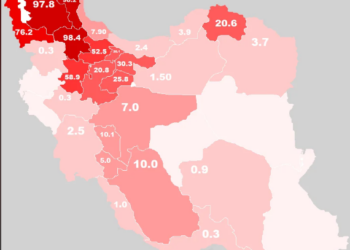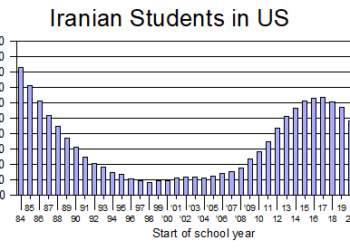September 21, 2018
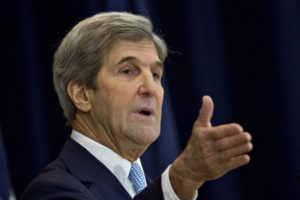
Secretary of State Mike Pompeo has unloaded on his Obama-era predecessor, John Kerry, for “actively undermining” US policy on Iran by meeting several times recently with the Iranian foreign minister.
President Trump went further, accusing Kerry of violating the law; Republicans started lining up to say Kerry should be sent to jail for what he did.
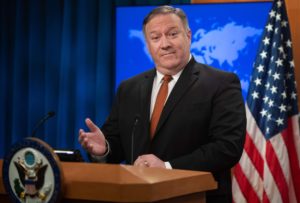
This is a two-century-old political ploy in Washington where politicians in power accuse politicians out of power of violating a law against negotiating with foreign governments and say they should be jailed for it. The law has never been used to jail anyone.
In unusually blunt and caustic language, Pompeo said September 14 that Kerry’s meetings with Mohammad-Javad Zarif were “unseemly and unprecedented” and “beyond inappropriate.”
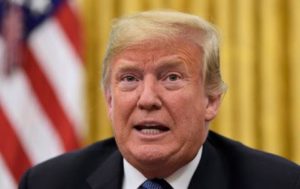
Pompeo’s blast was seen as unusual because Kerry’s visits with Zarif had been known for months and because Kerry’s spokesman said Kerry had telephoned Pompeo months ago to tell him about the visits, all of which took place before Pompeo became secretary of state.
On the other hand, the blast was not seen as unusual because it followed by a dozen hours a furious tweet by President Trump damning Kerry for the visits and even asserting that they violated the law. Many concluded that Pompeo was just trying to keep his boss happy.
Trump accused Kerry of holding “illegal meetings with the very hostile Iranian Regime, which can only serve to undercut our great work to the detriment of the American people.”
Pompeo ducked the charged of “illegality” by saying he would leave “legal determinations to others,” but slammed Kerry as a former secretary of state for engaging with “the world’s largest state-sponsor of terror” and telling Iran to “wait out this administration.” Pompeo didn’t say how he knew what Kerry had urged Iran to do. Kerry said he didn’t urge any such thing on Zarif.
“You can’t find precedent for this in US history, and Secretary Kerry ought not to engage in that kind of behavior,” an agitated Pompeo told reporters at the State Department. “It’s inconsistent with what foreign policy of the United States is, as directed by this president, and it is beyond inappropriate for him to be engaged.”
Actually former secretaries of state meet with foreign officials often. Henry Kissinger has been doing this constantly in the almost half century since he left the State Department.
Kerry, who is promoting his new book, “Every Day is Extra,” seemed delighted by the publicity the controversy provided and used it to give more coverage to his book. He tweeted a response to Trump that referred to the president’s former campaign chairman, Paul Manafort.
“Mr. President, you should be more worried about Paul Manafort meeting with Robert Mueller than me meeting with Iran’s FM. But if you want to learn something about the nuclear agreement that made the world safer, buy my new book,” said Kerry.
In a statement, Kerry’s spokesman, Matt Summers, said: “There’s nothing unusual, let alone unseemly or inappropriate, about former diplomats meeting with foreign counterparts. Secretary Kissinger has done it for decades with Russia and China. What is unseemly and unprecedented is for the podium of the State Department to be hijacked for political theatrics.”
What’s more, Summers said Kerry had long ago briefed Pompeo on his talks with Zarif. “In a long phone conversation with Secretary Pompeo earlier this year, he [Kerry] went into great detail about what he had learned about the Iranian’s view. No secrets were kept from this Administration.”
Pompeo said, “I wasn’t in the meeting, but I am reasonably confident that he was not there in support of US policy with respect to the Islamic Republic of Iran.
“Former secretaries of state — all of them, from either political party — ought not to be engaged in” this kind of activity, he said. “Actively undermining US policy as a former secretary of state is literally unheard of.”
Meetings between a private US citizen and foreign official are not against the law. However, a law from 1799 forbids private citizens from negotiating with foreign governments. No one has ever been convicted under that law, the Logan Act.
As recently as 2015, the Logan Act was raised by Democrats against Republicans, in a mirror image of what is going on now. The Senate was considering the Iran nuclear agreement and 47 Republican senators wrote Iran warning that any agreement made without Senate approval could be undone by the next president. Democrats shouted loudly that they were violating the Logan Act and should go to jail.
Nothing came of that shouting match, which was forgotten after several days.
Prosecutors ignore the Logan Act because most analysts see talks between a private citizen and a foreign government qualifying as speech that is protected under the First Amendment.
But Trump didn’t raise the Logan Act. He referred to a different law. Trump tweeted, “John Kerry had illegal meetings with the very hostile Iranian Regime, which can only serve to undercut our great work to the detriment of the American people. He told them to wait out the Trump Administration! Was he registered under the Foreign Agents Registration Act? BAD!”
The Foreign Agents Registration Act, or FARA, requires registration by people or companies acting on behalf of foreign governments. That is meant to give transparency when people lobby Congress to do things foreign governments want. That’s the exact opposite of what Kerry was accused of doing.
Reports of Kerry’s contacts with Zarif first surfaced in May. Back then, Trump tweeted May 8, “John Kerry can’t get over the fact that he had his chance and blew it! Stay away from negotiations John, you are hurting your country!” A day earlier, Trump tweeted: “The United States does not need John Kerry’s possibly illegal Shadow Diplomacy on the very badly negotiated Iran Deal. He was the one that created this MESS in the first place!”
Trump’s and Pompeo’s criticisms came after Kerry told conservative radio host Hugh Hewitt that earlier reports of his meetings with Zarif were correct: They had met three or four times since Kerry left office but not since Pompeo took the job in April. One of those meetings took place in Oslo, Norway, and another in Munich, he said. A third occurred at United Nations headquarters.
Kerry told Hewitt that he had not coached the Iranians on how to deal with the Trump Administration. “What I have done is tried to elicit from him [Zarif] what Iran might be willing to do in order to change the dynamic in the Middle East for the better.”
















